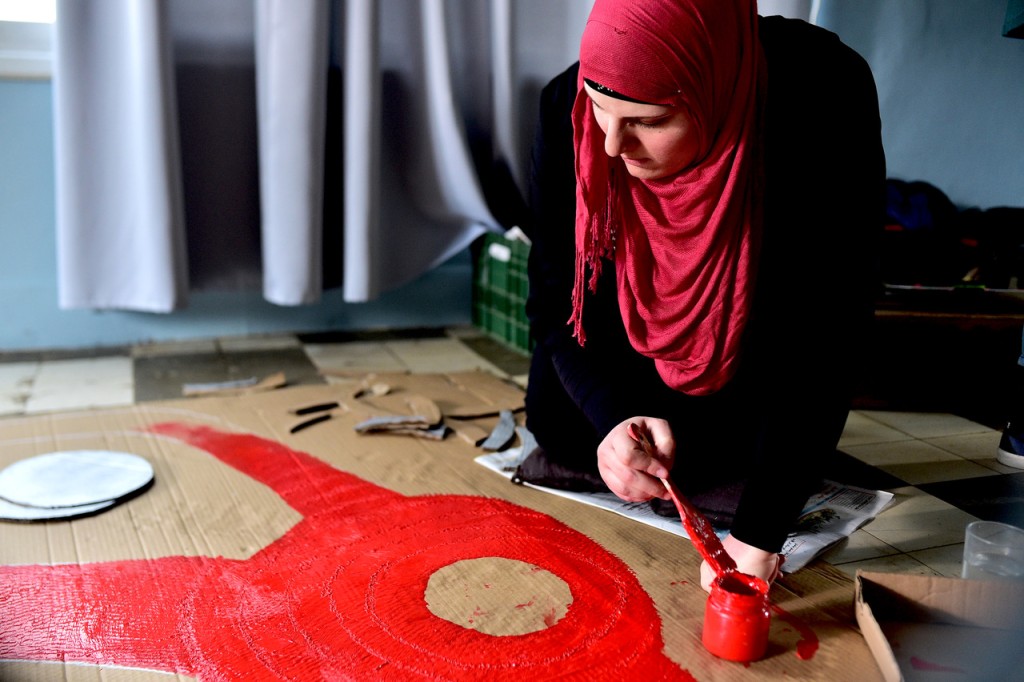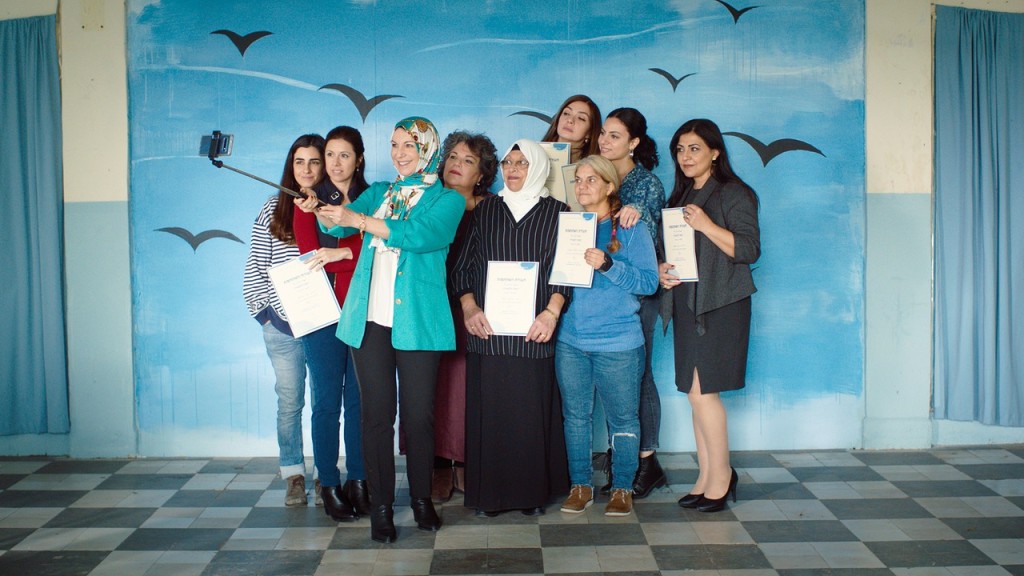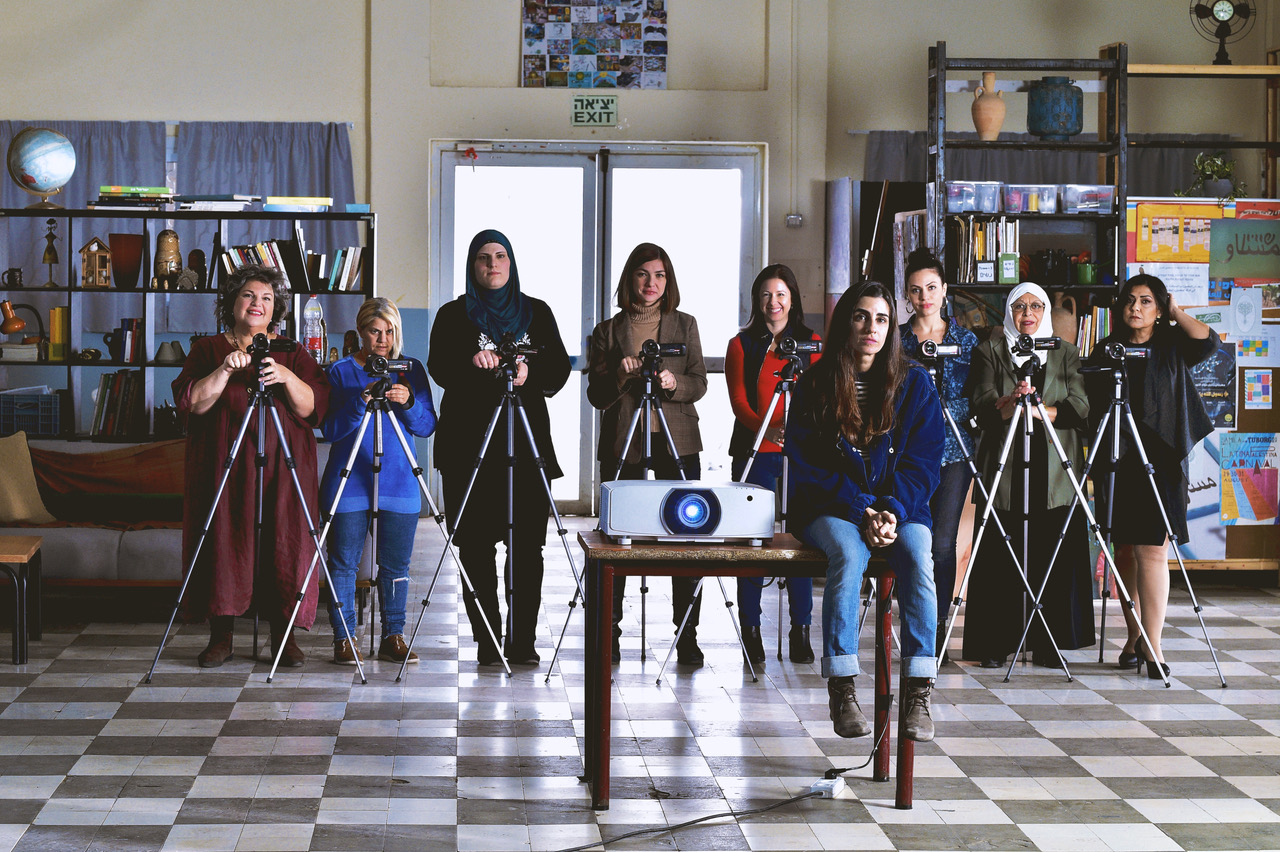
It’s a commonly accepted truism that mathematics and perhaps dancing are international “languages” and can be practiced most anywhere in the free world. I can personally speak to the dancing reference having danced with people in European countries without actually understanding or speaking their native language. Certainly cinema can easily fall into that category as some stories are pretty universal. After watching CINEMA SABAYA, written and directed by Orit Fouks Rotem, the idea of the universality of life’s experiences and challenges, beautifully unfolds, layer by layer, in Orit Fouks Rotem’s well-made, inspirational film about women of disparate backgrounds coming together for a common purpose.

Briefly, the story revolves around eight women who have signed up for a filmmaking class run by Rona (Dana Ivgy) at a local community center called the Center for Social Justice. The group is mixed, comprised of both Israeli and Arab women – some religious, some not, and ranges in ages from 30 something to 70 something. Most of the women are married, some are single and one, who after her divorce at age 38, Yelena (Yulia Tagil) had to move back to her mother’s home with a child. Their hopes and dreams in life are divergent, from wanting to be a movie star or a singer to having her own apartment or becoming a grandmother. The first woman to speak is one of the older women, Awatef (Marlene Bajali) who tells her story in Arabic. Another participant is Nasrin, (Amal Murkus) a lawyer and social and political activist who has dreamed of becoming a singer. Eventually, with the group encouraging her, she works up the courage to sing and regales them with a beautiful song sung in Arabic, which Rona stages in front of a green screen, with a fan blowing her hair for a glamorous effect. She laughed heartily when she saw herself on film with her hair flowing in the breeze. Like their backgrounds, their lifestyles are quite different, ranging from living in cramped apartments to Carmela (Liora Levy) who lives on a boat. Perhaps the one who is most repressed is an Arab woman named Souad (Joanna Said.) She has six children and works for the elderly. Her dream is to learn how to drive and to secure a driver’s license. Her husband is “traditional” and doesn’t support her driving, so he either takes her to work or she travels by bus. A subtle difference in cultures occurs when one of the women suggests she take lessons and not tell her husband, while another warns that she should not do anything behind his back. Although she would like to go to the beach, she doesn’t feel comfortable doing so as she thinks people stare at her hijab. Gila (Ruthie Landau) was a victim of domestic violence and fearing for her and her children’s safety, she divorced that husband and has rebuilt her life with a new loving husband. Armed with their cameras, and instructed to film their everyday lives, and anything that is important to them, the women begin to bring in their work. The first set of films are quite amateurish from shots of a cat to close-ups of a sleeping husband. However, the one that was the most provocative and mysterious was shot by Souad, which was just a big metal tub with water running into it. Based on critiques and honing their skills, the work improves. At home, Rona asks her little girl “How was your day?” to which the annoyed child replies “Mom, what do you want?” As you might expect, politics rears its ugly head and sometimes heated discussions take place about their respective belief systems but regarding the work, the women critique each other’s films in a kind, supportive manner. As they bond more and more with each other, their meetings take on the tone of a support group, encouraging each other to pursue whatever her dream might be. As the workshop comes to an end, Rona informs the group that after looking at all their footage, she would like to make it into a feature film. There is mixed response to that idea from enthusiasm to feelings of betrayal. In any case, the film got made and one that will engender laughter and perhaps a few tears. The work is quite compelling and a lesson in how we can bridge our differences using an international language, such as film, and that underneath it all, we are all still part of the same extended family – with similar hopes and dreams. Without being a spoiler, be sure and watch the closing fabulous credits to find out what happens to each of these incredible women – especially Souad.

While all the women give wonderful, believable performances under Orit Fouks Rotem’s precise and sensitive direction, the most repressed, and eventually the most heroic woman of the group, is played by Joanna Said who gives a heartfelt performance earning her winner of the Israel’s Ophir Award for Best Supporting Actress. The film also won Best Film and Best Director and is Israel’s official submission for Academy Award consideration in the Best International Feature Film category. It will be released on February 24 and will begin screening at the Laemmle Royal Theatre.
Written & Directed by: Orit Fouks Rotem
Starring: Dana Ivgi, Amal Murkus, Marlene Bejali, Ruthie Landau, Haula Haj-Divsi, Joanna Said, Yulia Tagil, Asil Farhat, Orit Samuel, Liora Levy.
Cinematographer: Itay Marom
Edited by: Neta Dvorkis
Music by: Karni Postel
Languages: Hebrew, Arabic & English
Running Time: 92 Minutes
Release Date: February 24 – Laemmle Royal Theatre
Language: Hebrew, Arabic, English













